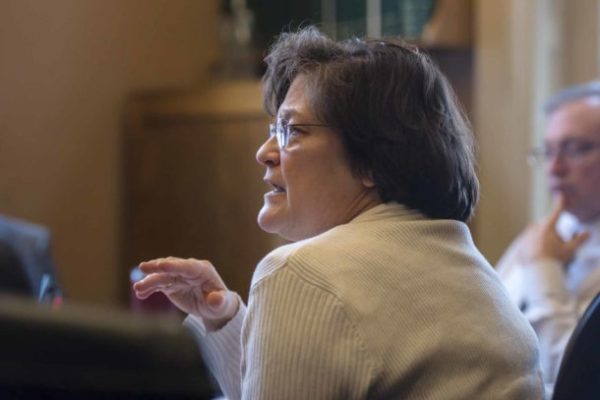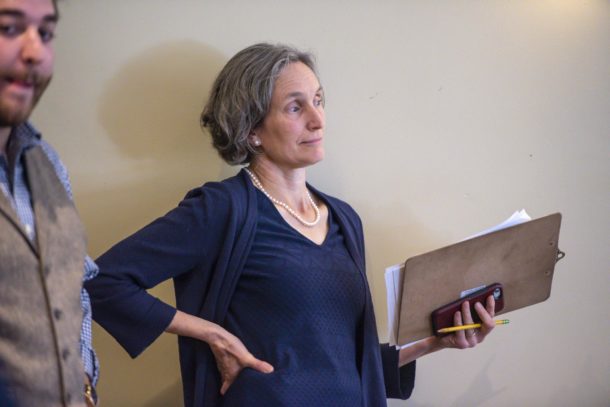
By this time next year, Vermont could have a female governor, lieutenant governor, House Speaker and Senate President Pro Tem. That would represent a dramatic step forward for women in politics, and help position candidates to break the final barrier: Electing the first woman ever to Vermont’s congressional delegation.
“I think it’s got a bullseye painted on it,” said Rep. Sarah Copeland Hanzas, D-Bradford, of the congressional glass ceiling. “A lot of women politicians are talking about the need to elect a woman to Congress.”
Copeland Hanzas considered a run for lieutenant governor, but chose to remain in the House. But even without her, the LG race will make some history of its own: At least two women, and almost certainly three, contending with a single male candidate for the Democratic nomination. Sen. Debbie Ingram, D-Chittenden, and 2018 gubernatorial candidate Brenda Siegel of Newfane have already declared; Assistant Attorney General Molly Gray has registered her campaign with the Secretary of State’s office and plans an announcement in the near future.
The only man in the race? Senate President Pro Tempore Tim Ashe, D/P-Chittenden.
That, in itself, is a milestone. “It takes the pressure off ‘the woman’,” said Sen. Ruth Hardy, D-Addison. “We’ll have a diversity of women, experiences, and ideas.”
Ingram is a state senatorwho brands herself as a conciliator. Siegel, an advocate for progressive causes, would use the LG’s office as a conduit for “bringing people into the process,” she said. The 35-year-old Gray sees herself as representing a new generation that has little presence in state government. Women dominating a field for high office “is a sign of success,” said House Majority Leader Jill Krowinski, D-Burlington, executive director of Emerge Vermont, a nonprofit that recruits and trains women to run for office as Democrats. “It’s not the first time, but we’re seeing it happen more.”

Two Republican women are also seeking high office; Meg Hansen of Manchester, advocate for market-based health care reform, is running for lieutenant governor, and Alice Flanders is in the race for state auditor as a member of the “Agri-publican” ticket.
But most female candidates are on the Democratic side, and a lot of the credit belongs to Emerge Vermont. (There is no Republican equivalent.)
VTDigger is underwritten by:
“The efforts of Emerge are paying off,” said Hardy, the founding director of Emerge. “There’s a strong bench of women ready to run up and down the ballot.” And when women run, she added, they win at the same rate as male candidates. But first they must overcome societal barriers to candidacy.
“There are a lot of people like me, who are community activists but they believe they can’t be competitive in campaigns,” said Siegel, who came out of nowhere in 2018 to win 20 percent of the Democratic primary vote. “I showed it can be done in three months with no name recognition.”
Krowinski, D-Burlington, who succeeded Hardy as Emerge chief, pointed out that the three Democratic LG candidates have all taken Emerge training. “We are making strides to ensure that women have an equal chance at these opportunities,” Krowinski said.
There’s a strong roster of Emerge grads who are ready for any opening that presents itself. This year, that could include several seats in the state Senate. There are rumors of multiple retirements among the old lions of the Senate. 2020 is likely to be a good year for Vermont Democrats, which makes it a safe time for veteran incumbents to step aside. Everyone has their own list of possible retirements, but the oft-cited names include Sens. Dick Sears, D-Bennington, Dick Mazza, D/R-Grand Isle, Dick McCormack, D-Windsor, Brian Collamore, R-Rutland, and Jeanette White, D-Windham. In all of those districts and others, Krowinski said, there are capable women waiting for their chance.
None of those senators has declared an intent to retire, and a wave of departures may or may not occur. But if there is significant turnover, the Senate could be a very different institution in 2021 and beyond. There’s the potential for three women on the Senate’s powerful Committee on Committees, which chooses committee chairs and names committee members.
That body includes the Pro Tem, lieutenant governor and a third member. Mazza has filled the latter role for years. There’s never been a female Pro Tem, and we’ve had only three female LG’s. (Setting aside the possibility that one or more of our 19th century leaders was secretly female or transgender, which did happen in the Good Old Days.)
Madeleine Kunin remains Vermont’s only female governor. There’s never been a female attorney general, and so far there’s no sign of a woman seeking that office.
When you look at it all, Vermont’s record on gender equity in politics is pretty sad. Only in recent years have women started climbing the ladder in anything more than a token manner.

“You see a lot of this movement leading up to 2022,” Hardy said. “Our congressional seat and one Senate seat will be up. Many are speculating [the Senate seat, currently occupied by Democrat Patrick Leahy] may be open. It’s important to see this movement in 2020, setting up for 2022.”
There is one other barrier to be smashed: The tendency to judge female candidates on their appearance. The gubernatorial campaign of Democrat Rebecca Holcombe has fielded suggestions that she should color her hair. “It would be amazing to see a statewide campaign with women candidates where none of the coverage is about their hair or clothes,” Krowinski said.
Someday…



